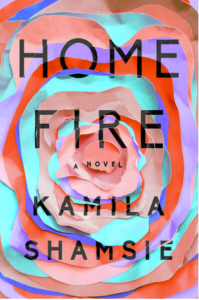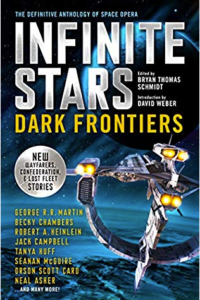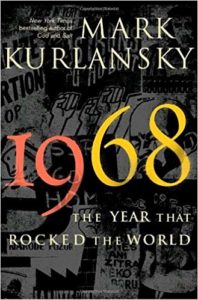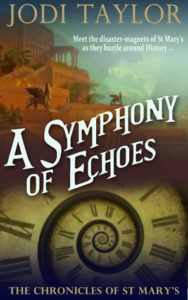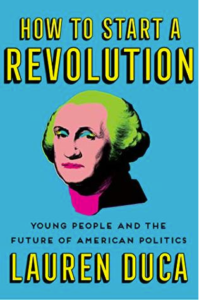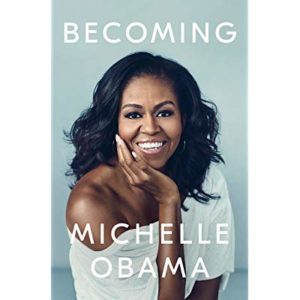Several months after finishing Ian McDonald’s Luna trilogy — Luna: New Moon, Luna: Wolf Moon, and Luna: Moon Rising — the two things that have stuck with me the most are the scale of the achievement and the vividness of so many scenes throughout the books. McDonald has brought a great deal of life to a dead world, given it firm ground to take root in, and set loose epic conflicts among larger-than-life personalities.
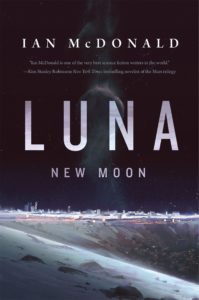
The moon has been colonized for decades, long enough for a substantial society to have been set up, with cultures and fashion and divergence from the mother world, but recent enough that the moderately extended lives of the founding generation are just nearing their ends as McDonald’s story begins. Or rather, some of those lives are nearing their ends; many more ended earlier in accidents or conflicts among the families who have come to dominate lunar society. The moon remains a harsh mistress, with missteps, mayhem, or radiation bringing many lives to premature ends. Nevertheless, people emigrate willingly to the moon. Wages there are fantastic, and opportunities in many earthside societies are even more limited in the future than they are in the present.
Luna’s main export to Terra is helium-3. In McDonald’s setting, fusion is no longer fifteen years in the future, as it has been on earth for the last forty years, but has become humanity’s main power source. Helium from the lunar regolith keeps the lights lit on humanity’s home planet. Much of the moon is a mining operation, and the rivalries among mining clans drive much of the conflict in the extended story.
McDonald opens his tale with a new rite of passage: a moon-run. Naked, exposed in the vacuum on the lunar surface. Twenty meters, ten strides for the six young people first crammed into a capsule and then dashing across the dust and rock to the safety of the next airlock. They are golden youth of Luna’s leading families: a Corta from the helium masters; two Asamoahs, Luna’s life-givers; a Mackenzie, the metal miners; a Sun of trade; and a Vorontsov from the controllers of the routes between earth and moon. These families are the Five Dragons of the moon, clans in constant intrigue, competition, enmity and alliance. They also draw on five earthside cultures reflecting their origins. The Cortas are from Brazil, Mackenzies from Australia, Asamoahs from Ghana, Suns from China and Vorontsovs from Russia. During the moon-run, one of the Asamoahs stumbles, a potentially fatal error. Lucasinho Corta risks his own life by helping his fellow runner to make it to the second gate safely. The obligations thus incurred will ripple throughout the story.
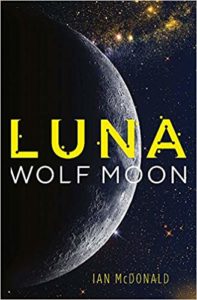
For his second scene, McDonald moves to the opposite end of the lunar hierarchy. Marina Calzaghe is new to the moon, and her life is precarious. The Four Elementals — water, space, data, and air — are closely monitored, and nothing is free. Marina has quarters near the surface, where radiation can more readily penetrate than to the deeper homes of the wealthy, and work has been scarce so she has had to dial back her breathing to an uncomfortable level.
Contrasts established, McDonald brings the opposites together, begins to introduce his sprawling cast, and lets the clans pick up their conflicts that had been held in abeyance. Marina gets hired by the Cortas as part of the catering staff for a party, and her combination of previous training, good reflexes, and earthside strength undimmed by long tenure on the moon prevent the assassination of the Corta heir. From that moment, the action seldom slows, though sometimes various characters try to channel the conflict into less overtly deadly forms. On the other hand, with the moon set up as something of a libertarian utopia — there is no criminal law, and everything is negotiable under contract law, with trial by combat as a final resort — that is a purely relative matter. And even with a significant settled population on the moon and decades of experience maintaining habitats and vehicles, death by misadventure and vacuum is never far away.
Continue reading
 Our heroine is Stella, an econometrician and autistic who has trouble socializing: not great when her mom has high hopes of grandbabies out of her only child. Her experiences with men have been so terrible that she decides that the most rational way to overcome them is by getting better at sex. So she hires Michael, a half-Vietnamese half-white escort, to teach her. Soon enough, they’ve graduated to practicing at a relationship instead of just practicing in bed. But will her neuroatypical reasonings and his self-punishing prejudices keep them from committing to the love they’re growing together?
Our heroine is Stella, an econometrician and autistic who has trouble socializing: not great when her mom has high hopes of grandbabies out of her only child. Her experiences with men have been so terrible that she decides that the most rational way to overcome them is by getting better at sex. So she hires Michael, a half-Vietnamese half-white escort, to teach her. Soon enough, they’ve graduated to practicing at a relationship instead of just practicing in bed. But will her neuroatypical reasonings and his self-punishing prejudices keep them from committing to the love they’re growing together?
